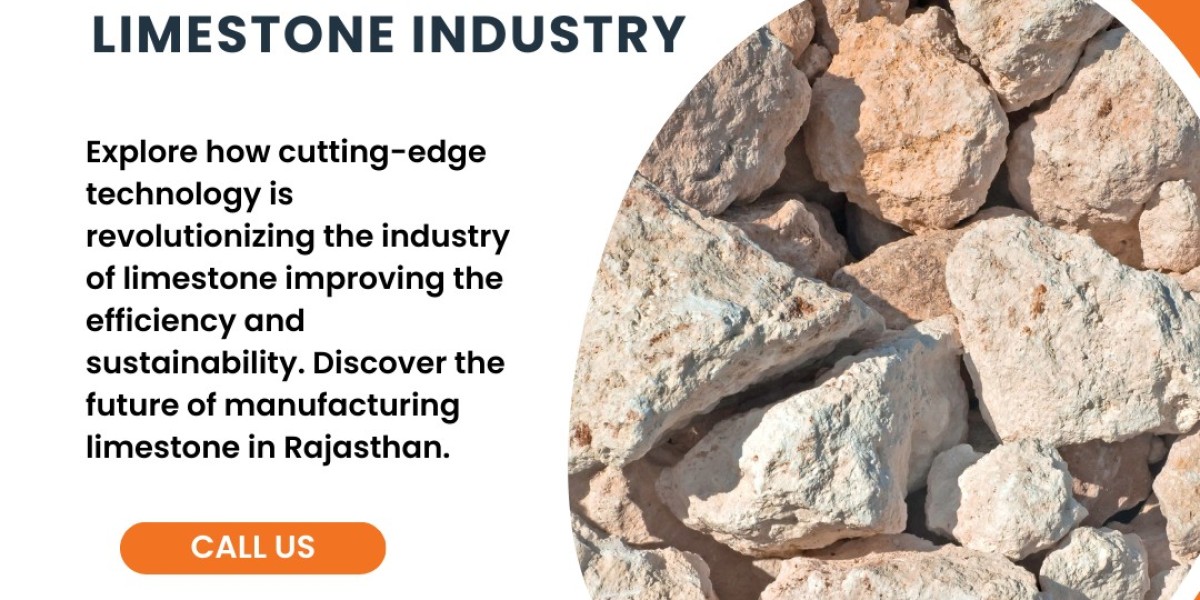The industry of limestone, which is one of the oldest and vital sectors in the globe is currently going through a transformational period thanks to new technologies. These advancements are not only making the industry more efficient but are also paving the way for sustainable practices that are crucial in today's environmentally-conscious world. In the era of automation and green power the future of the industry is looking promising, especially in regions such as Rajasthan in India, where limestone producers are pioneering the way.
Automation and Robotics: Enhancing Efficiency
Robotics and automation are at top of the technological advances in the industry of limestone. In the past, limestone extraction and processing were labor-intensive, typically involving the use of heavy machinery and manual labor. But with the introduction of automated processes, these procedures are becoming more efficient and efficient.
Automated systems are capable of carrying out tasks like cutting, drilling, and transporting limestone with little human involvement. These machines not only decrease the amount of time required to perform these tasks, but also improve accuracy, resulting in less waste and more quality products. For example in limestone manufacturers rajasthan factories are progressively adopting robot arms as well as automated conveyors in order to improve efficiency of production and lower operating costs.
The introduction of robotics has also improved the safety standards of limestone quarrying. Workers are no longer subject to the same amount of danger as they were before, since robots can now handle the most dangerous jobs. This change not only safeguards the workers, but also provides the production of a consistent level which is vital to keeping up with the ever-growing need for limestone.
Advanced Material Processing: Improving Product Quality
One of the major issues in the industry of limestone has been the variance with regards to the high-quality of extracted stone. The traditional methods typically resulted in uneven products, which can impact the final use for agriculture, construction or in other fields. However, modern technology for processing materials is changing the game.
Innovative technologies like laser-based sorting as well as advanced crushing techniques allow limestone producers in Rajasthan to make better products. These methods enable more precise and accurate sorting of limestone and ensure that only the finest materials are used in the production. This improves not only overall quality, but reduces waste and makes the process more sustainable.
Furthermore, advances on grinding techniques have allowed the creation of ultra-fine limestone powders that are sought-after across a range of industries, such as paints, plastics and other chemicals. With the production of finer and more uniform particles, limestone producers in Rajasthan can provide a wider range of uses, thus expanding the market they serve.
Sustainable Practices: Paving the Way for a Greener Future
As the world moves toward sustainable development, the limestone industry is not an exception. Modern technology is allowing limestone producers to adopt more sustainable practices, decreasing their carbon footprint as well as protecting natural resources.
One of the most important advances in this area is the utilization of renewable energy for limestone processing. Wind and solar energy is becoming increasingly utilized to power limestone quarries as well as processing plants. This is not just reducing the reliance of the industry on fossil fuels, but also lowers the cost of operation over the long term. In Rajasthan where the sun shines abundantly the majority of limestone producers have invested in solar panel systems to tap this energy source that is renewable.
Another green practice that is gaining momentum is recycling leftover limestone. Instead of throwing away the limestone by-products from its extraction and processing, figuring out ways to make them useful again. For instance, the waste limestone could be crushed, and used as a base to construct roads or combined with other materials to make green cement. This method not only decreases pollution but also generates sources of revenue for limestone suppliers rajasthan.
Additionally, water conservation techniques are being used in limestone quarries to limit water consumption. Closed-loop water systems as well as advanced filtering techniques permit the reuse of the water used in extraction and process stages. This is crucial in areas such as Rajasthan in India, where water scarcity is a major concern.
Digitalization: Transforming Operations and Supply Chains
Digitalization is a second major trend that is shaping how the industry will develop in the coming years. industry of limestone. Smart sensors, blockchain and even smart devices digital tools are being used in every stage of the limestone manufacturing process and management.
Smart sensors are currently employed in quarries to track various parameters, including temperature as well as humidity and vibration levels. They provide real-time information that can be used to improve the extraction process, making sure that the limestone is of top quality. Furthermore predictive maintenance tools powered by artificial intelligence aid limestone producers in Rajasthan decrease downtime by predicting breakdowns in equipment before they occur.
Blockchain tech is making an impact on the business by enhancing transparency and traceability within the chain of supply. By logging every single transaction and movement of limestone in a secure ledger that is decentralized, businesses can be sure the quality of their product is ethically procured and comply with all standards of regulation. This is especially important for limestone suppliers in Rajasthan which export their products to markets around the world with strict standards of sustainability and quality.
Conclusion:
The industry of limestone is at a crucial point in which embracing the latest innovations is no longer an option but essential for survival and expansion. The innovations mentioned in this article -- from automation and advanced processing of materials towards sustainable processes and digitalization -- are not only improving productivity and product quality but also helping ensure that the industry can compete in an ever-changing world.







